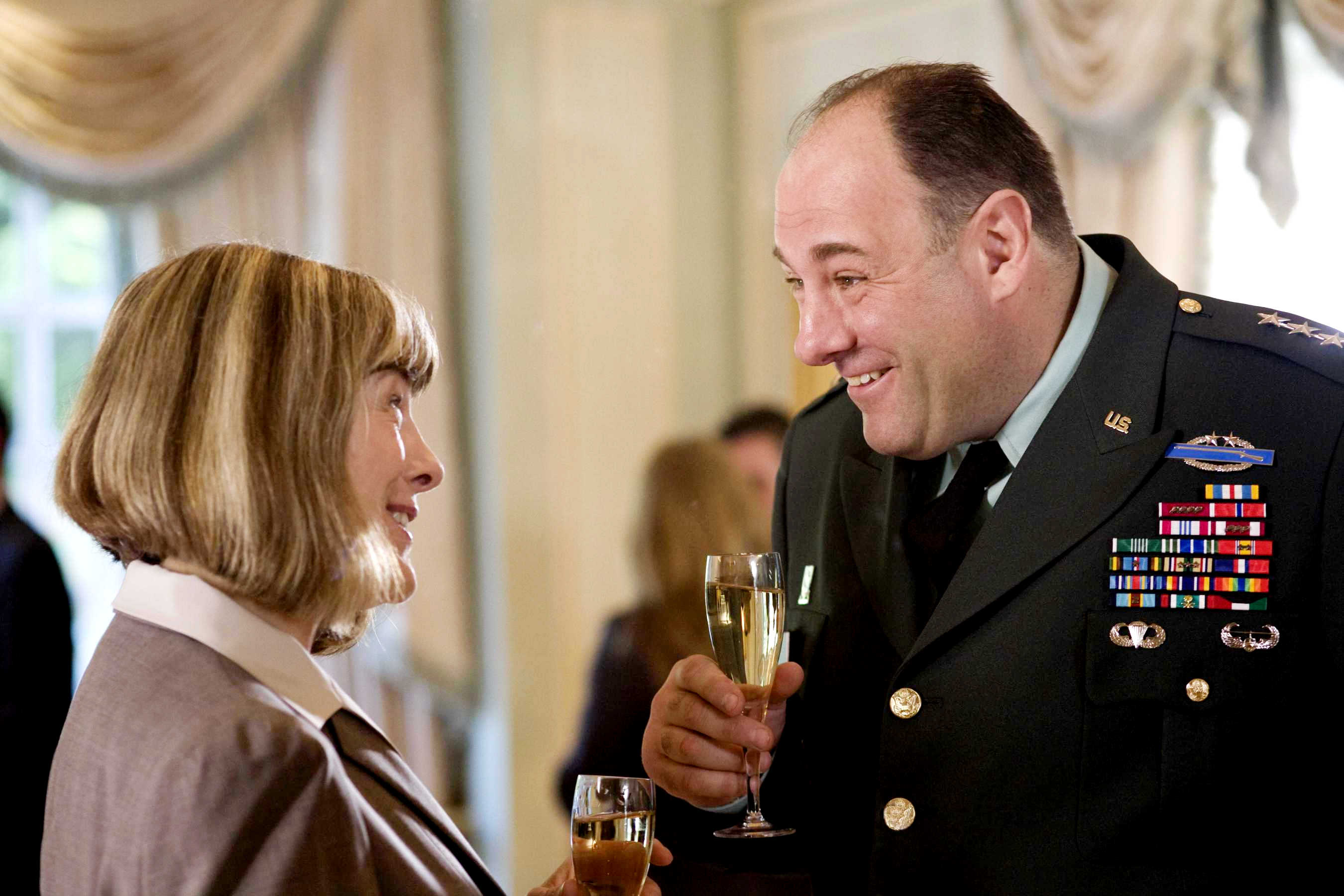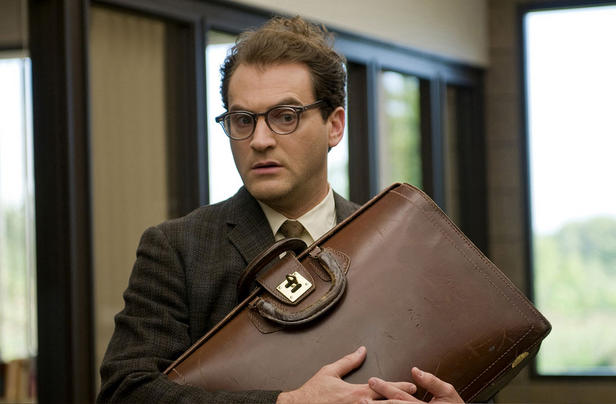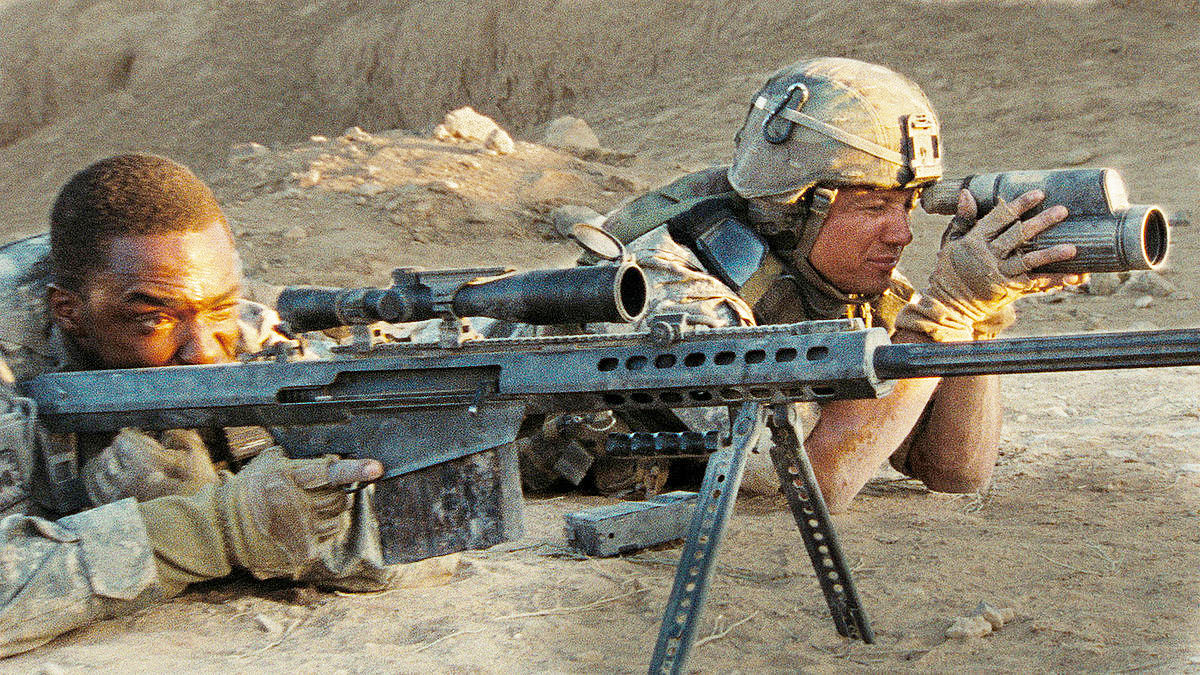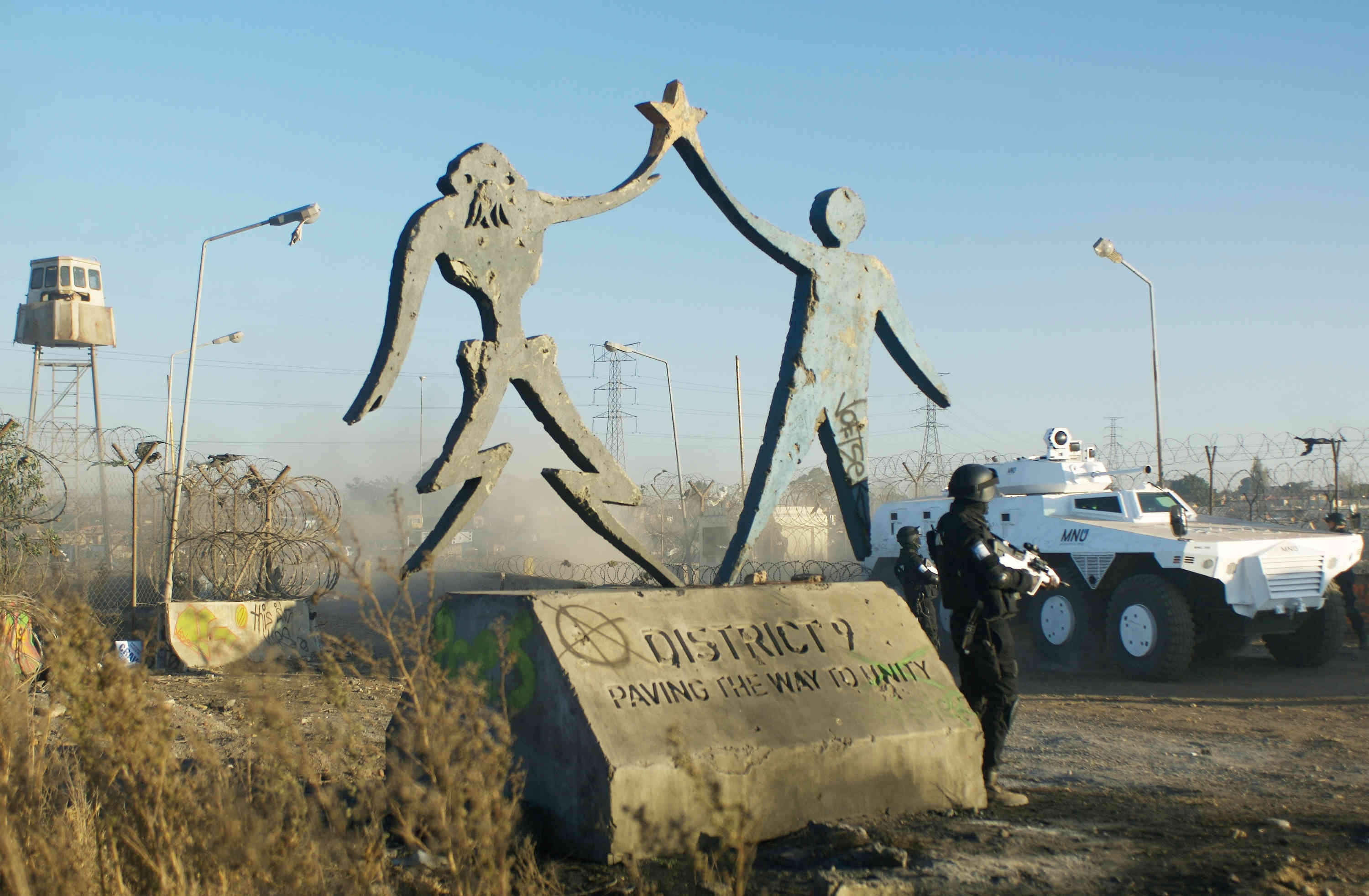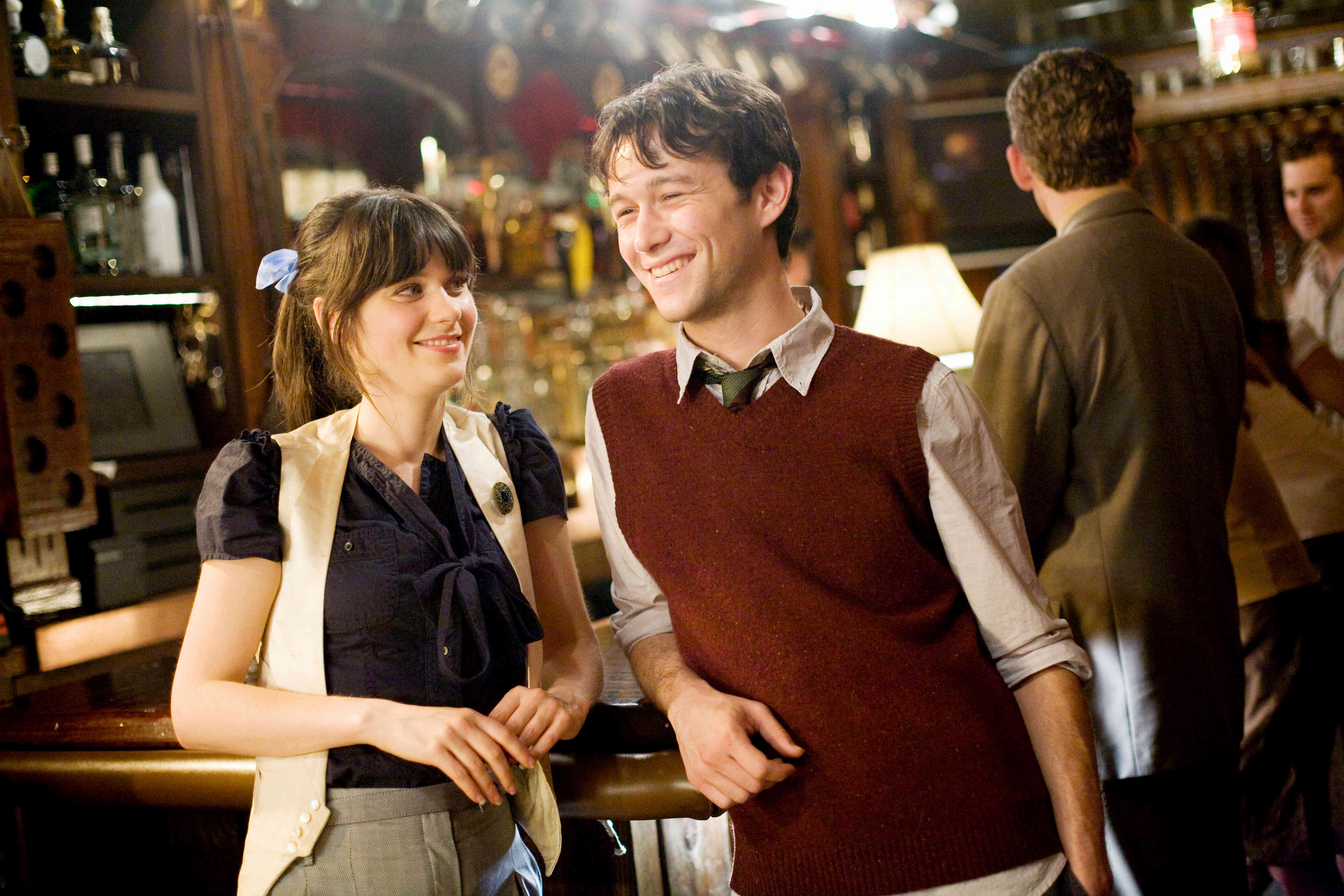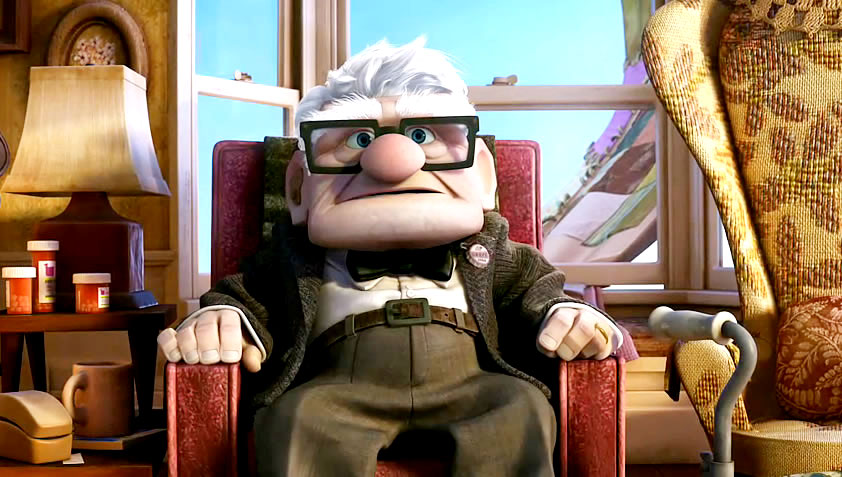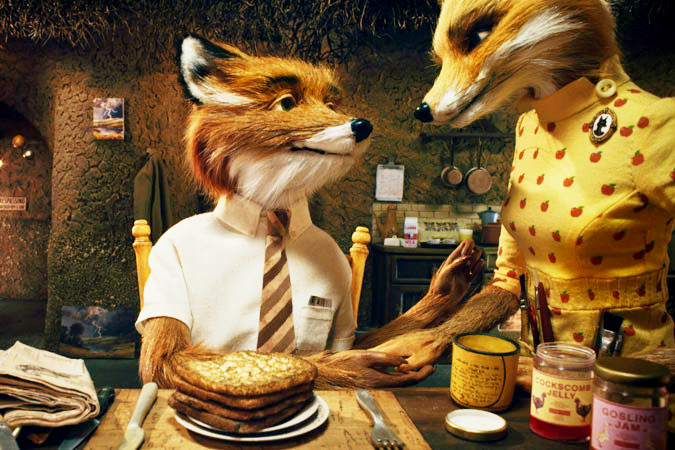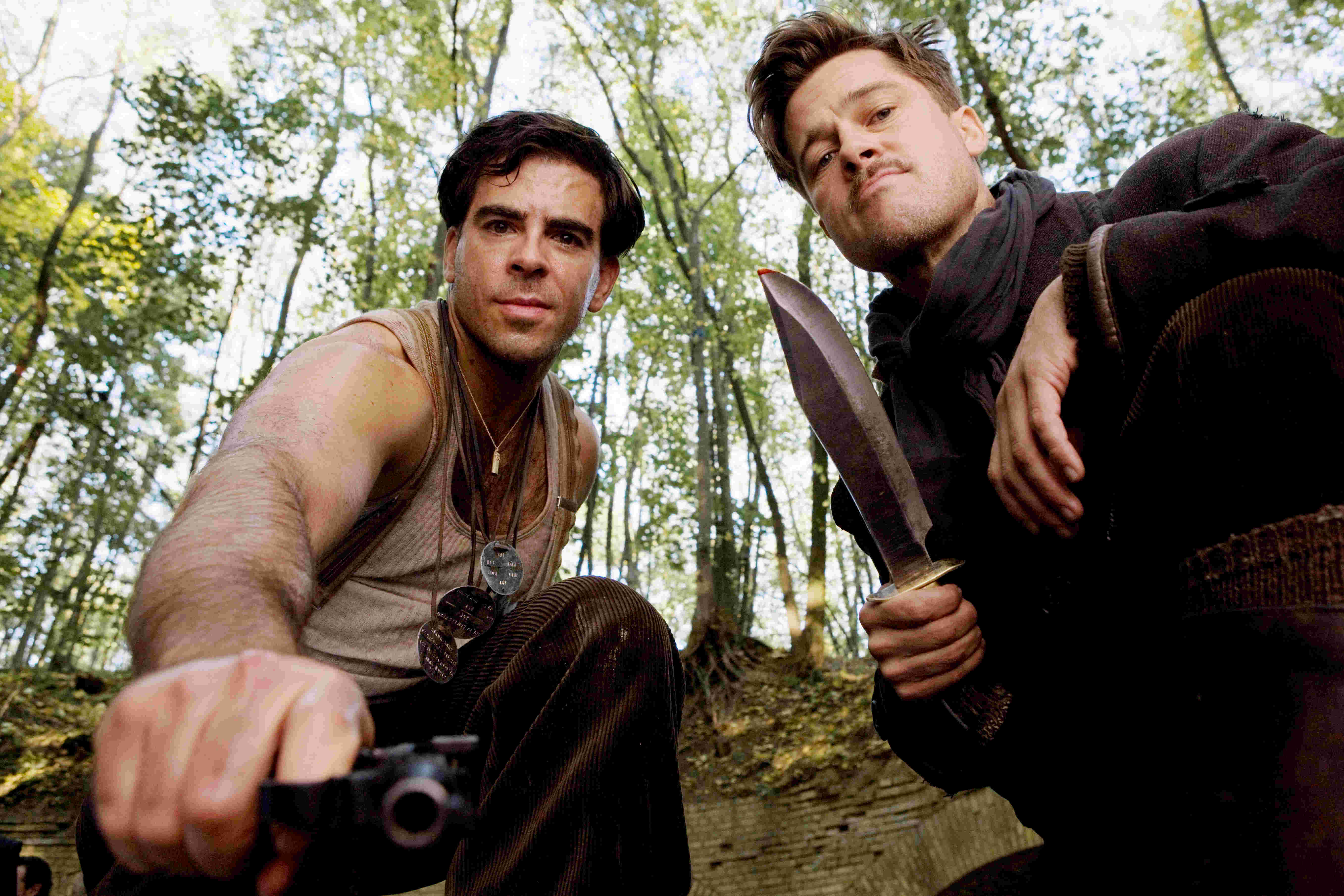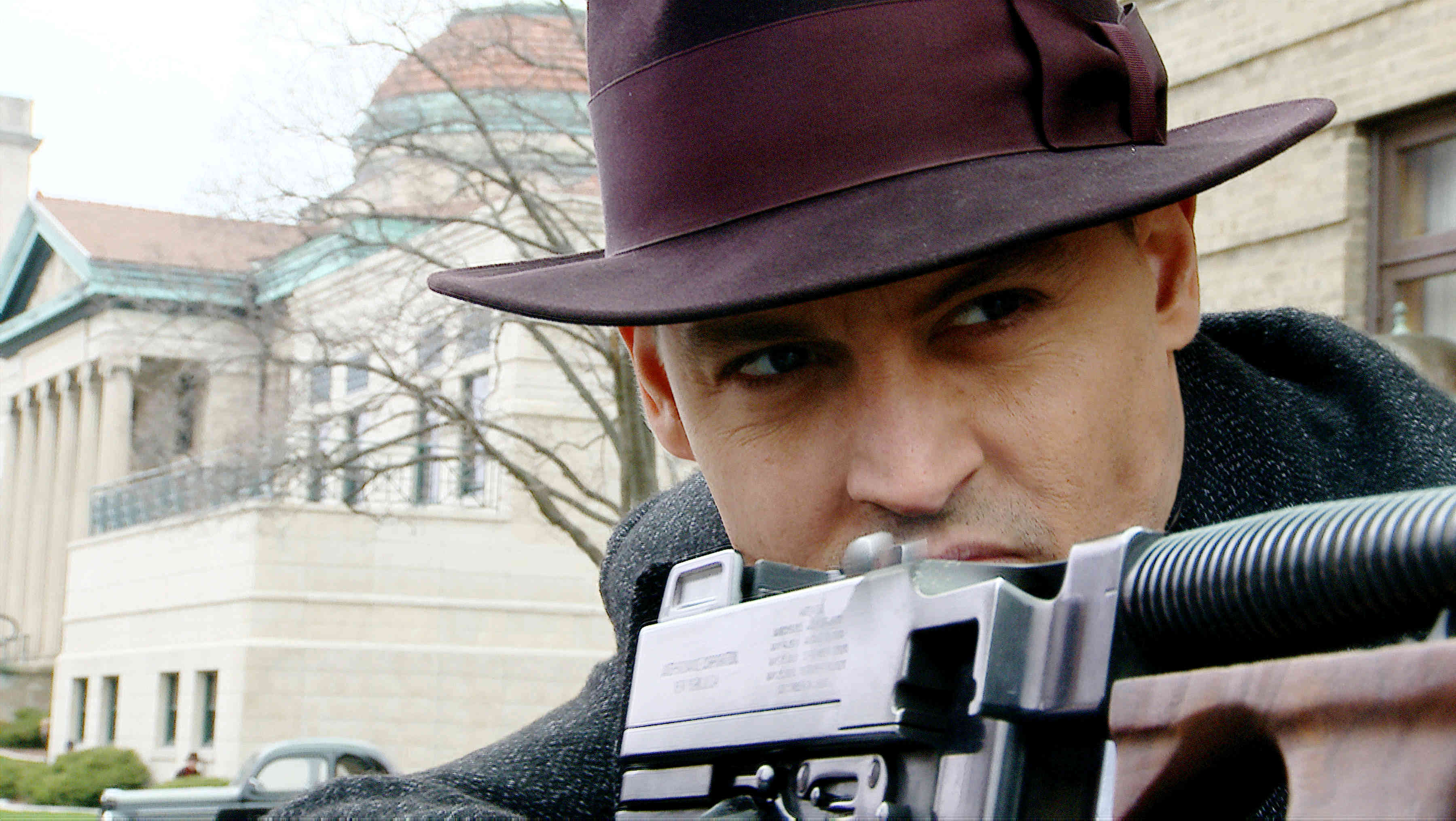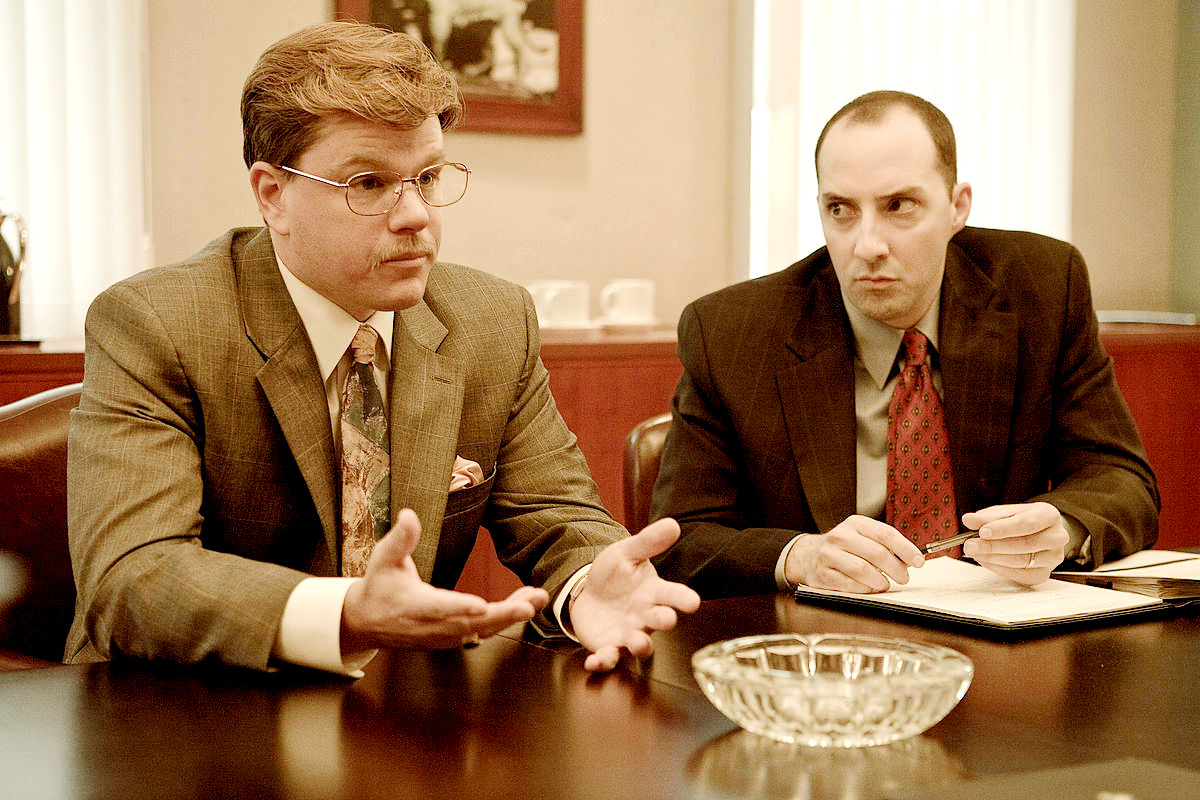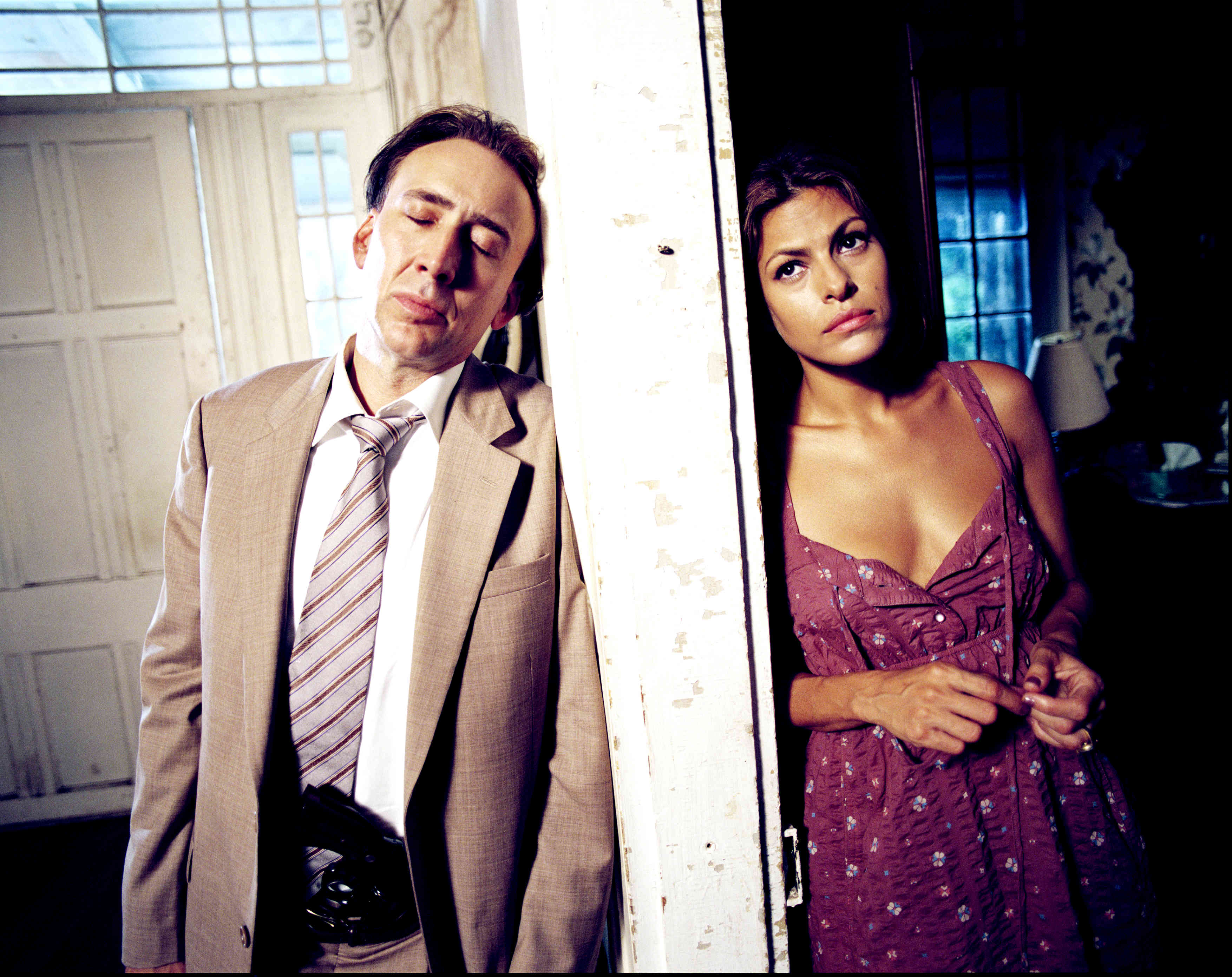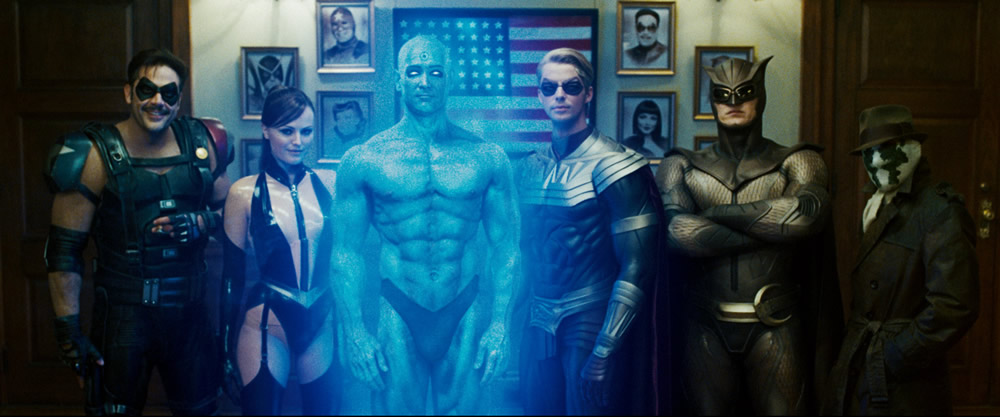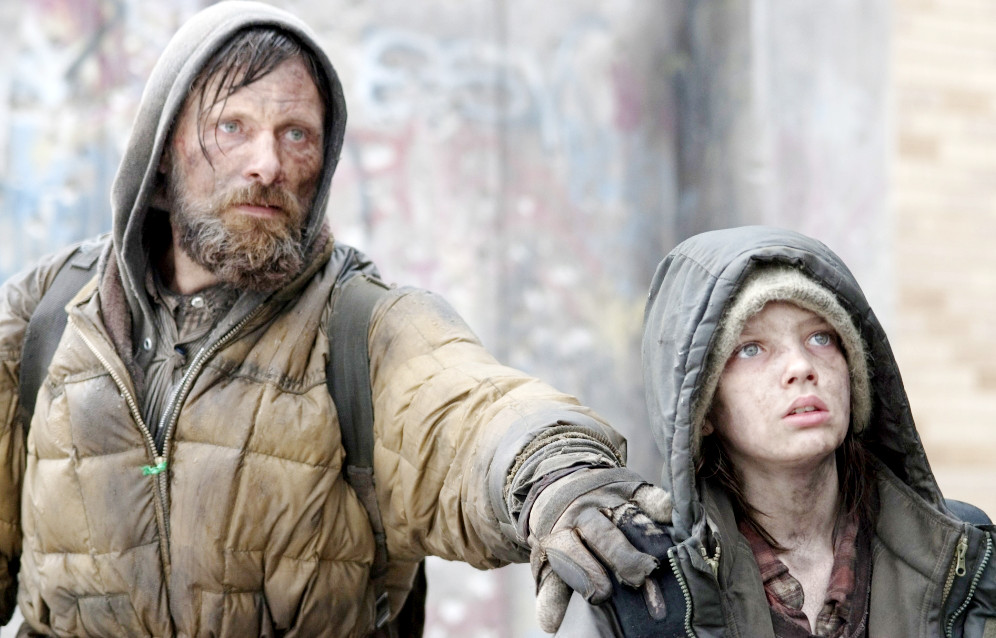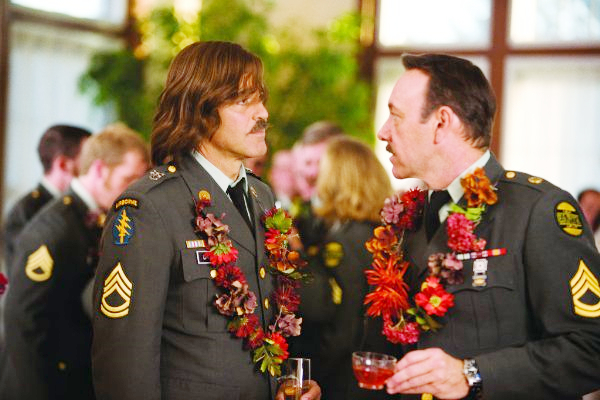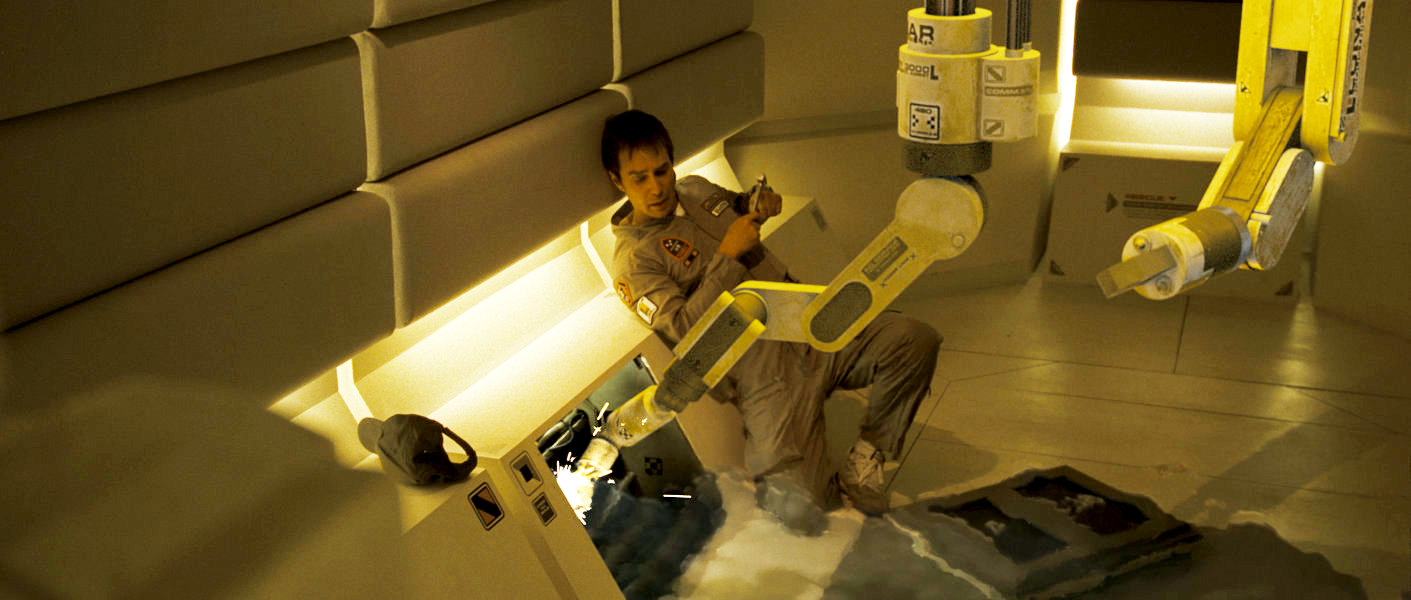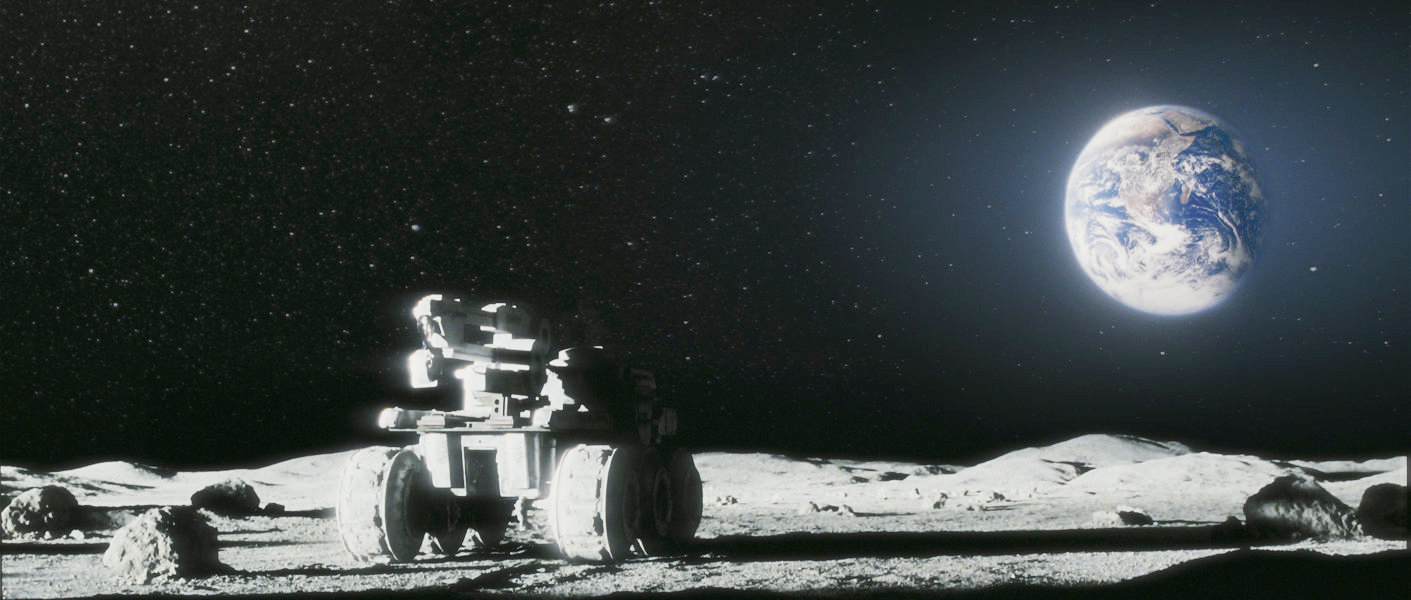Hello all. This got sidetracked a bit on account of holiday rest, birthday carousing, and such — Yep, as of yesterday, I’m now 35 years young. (“I’m old, Gandalf. I may not look it, but I feel it…“) In any case, hopefully everyone has had time to check out part I and part II by now. And, just in time for New Years’ Eve, I’ve gone back to the movie-reviewing salt mines to dredge up Part III of the…
Part III: 50-26
[The Rest of the List: 100-76 | 75-51 | 50-26 | 25-11 | 10-1]
[2000/2001/2002/2003/2004/2005/2006/2007/2008/2009]
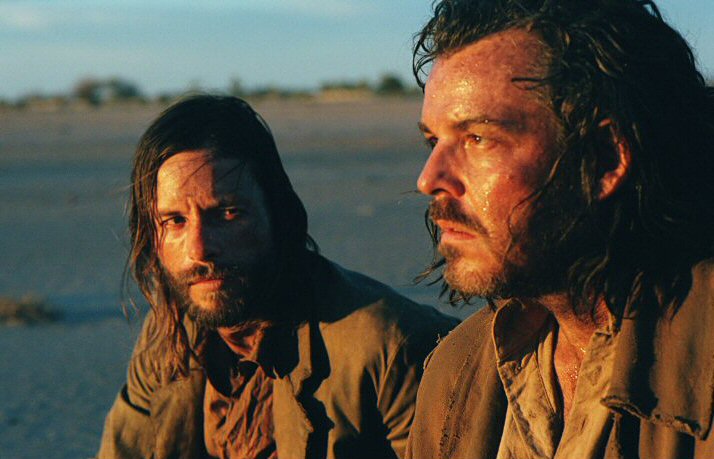
50. The Proposition (2005)
“Australia. What fresh hell is this?” As I noted in my review of his 2009 follow-up, The Road, John Hillcoat’s The Proposition was a movie I watched via Netflix late one night and felt like I had dreamed. There’s something very strange and ethereal at work here in this Nick Cave-penned western about an outlaw (Guy Pearce) sent to kill his ne’er-do-well brother (Danny Huston) by an equally ne’er-do-well lawman (Ray Winstone). (Well, I think that’s what it was about…I have a vague recollections of a filthy John Hurt talking his way in and out of trouble quite a bit too.)
Nonetheless, something about The Proposition makes it feel weirdly ancient and Biblical, like poetry and prophecy wrestling it out over an Outback campfire. I liked The Assassination of Jesse James by the Coward Robert Ford quite a bit — it’s on my almost list. But I get the sense that, in its heart of hearts, The Proposition is the movie Dominik’s sprawling epic really wanted to be.

49. The Bourne Trilogy (2002, 2004, 2007)
| From the year-end list (I): “Another surprise…Matt Damon is believable, Chris Cooper and Brian Cox do excellent character work here, and Franka Potente and Clive Owen help lend the film an authentic European flavor that’s gone completely AWOL over in the Bond series…If the first film’s any indication, I’d rather see another Bourne than another Bond“
From the original review (II): “[T]hankfully The Bourne Supremacy is just as intelligent, fast-paced, gritty, and near-plausible as the first outing…The surprise here is how well everything’s executed — until the last fifteen minutes or so…the film moves at a kinetic, captivating clip.“ From the year-end list (II): “[A] better Bond than anything we’ve seen in the past 20 years. Paul Greengrass’ shakicam work here bodes well for Rorschach in The Watchmen.“ From the original review (III): “If you see him, say hello, he might be in Tangier. Or Paris, Madrid, London, New York, Moscow…uh, sir, we have Jason Bourne popping up all over the grid here. Shall I put it on One?…[I]t’s clear that Greengrass is firing on all cylinders right now. I was already impressed with him, but Bourne further suggests that Greengrass is among the very best directors working today — Let’s hope he shares with us more surveillance intel in very short order.“ From the year-end list (III): “The third installment of the Bourne franchise was the best blockbuster of the year, and proved that director Paul Greengrass can churn out excellent, heart-pounding fare even when he’s basically repeating himself. Really, given how much of Ultimatum plays exactly like its two predecessors on the page — the car chase, the Company Men, the Eurotrash assassin, Julia Stiles, exotic locales and cellphone hijinx — it’s hard to fathom how good it turned out to be. But Bourne was riveting through and through…You just couldn’t take your eyes off it.“ |
True, Agent 007 received a much-needed 21st-century reboot in the Oughts with Casino Royale. But the decade belonged to Matt Damon’s Jason Bourne, who yielded three exemplary cloak-and-dagger entertainments between 2002 and 2007. The Bourne Identity was the highlight of director Doug Liman’s decade, wherein he established the international flavor and CIA-professional mien that would characterize the rest of this spy trilogy. And Paul Greengrass brought it home, first with The Bourne Supremacy and then The Bourne Ultimatum. I know Greengrass’ brand of kinetic shaky-fu isn’t for all action tastes, but I find it totally absorbing. And, hey, while Bourne III might’ve been a lot like Bourne II in the end, at least there were no invisible cars anywhere in the picture.

48. The Prestige (2006)
| From the original review: “[W]hile I can’t vouch for how well Nolan conceals his own prestiges from the audience here, I found the movie a dark, clever, and elegant contraption, one that suggests razor-sharp clockwork gears and threatening pulses of electrical current, all impressively encased in burnished Victorian-era mahogany. If you’re a fan of Nolan’s previous work, or of sinister mind-benders in general, The Prestige is a must-see film. Either way, it’s among the top offerings of 2006 thus far.“
From the year-end list: “[A] seamlessly made genre film about the rivalries and perils of turn-of-the-century prestidigitation…Throw in extended cameos by David Bowie and Andy Serkis — both of which help to mitigate the Johansson factor — and The Prestige was the purest cinematic treat this year for the fanboy nation. Christian Bale in particular does top-notch work here, and I’m very much looking forward to he and Nolan’s run-in with Heath Ledger’s Joker in The Dark Knight.“ |
Having read the Christopher Priest novel beforehand, I was in on the trick with this movie going in. So I still don’t know how Christian Bale’s putty nose played to the uninitiated. (The nose plays?) Nonetheless, I found The Prestige one of the most satisfying genre entertainments of its year. And, while I haven’t seen it since, I expect this Christopher Nolan conjuration should hold up quite well. (And a special bonus for Nolan’s introducing us therein to one of my current movie crushes, Rebecca Hall.)
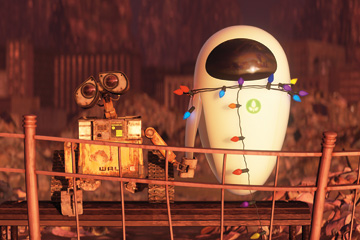
47. WALL-E (2008)
| From the original review: “Andrew Stanton’s ambitious, impressive WALL-E is definitely in keeping with the high standard we’ve come to expect from the Pixar gang…That the reach of WALL-E’s ambition ultimately exceeds its grasp in the second hour, when the movie becomes a much more conventional family flick, can’t be held too harshly against the film, I think…Still, after centuries of wandering around by himself, gazing at the stars, the Last Robot on Earth has fallen in love. Did we really need to contrive a second act to top that?“
From the year-end list: “If you saw one movie last year about a boy(bot) from the slums meeting — and then improbably wooing — the girl(bot) of his dreams, I really hope it was WALL-E. Hearkening back to quality seventies sci-fi like Silent Running, Andrew Stanton’s robot love story and timely eco-parable is a definite winner, and certainly another jewel in the gem-studded Pixar crown. I just wish it’d stayed in the melancholy, bittersweet key of its first hour, rather than venturing off to the hijinx-filled, interstellar fat farm.“ |
If WALL-E were just the opening forty-five minutes or so, it’d probably shoot up into the top 25, where it would rest next to another Pixar movie on this list. (Yes, in the immortal words of Yoda, There is another.“) But WALL-E started to lose me once our lovelorn robot left the junkyard and headed into space, and all the Starship Titanic goofiness on the back-end just can’t match the heart of the early going.
Still, in another decade of quality Pixar offerings, the first half of WALL-E was right up there among its finest productions. And, as I said in the year-end blurb above, this was the Slumdog Millionaire story of 2008 that i think will have the most staying power in the end.

46. The Royal Tenenbaums (2000)
While The Fantastic Mr. Fox will no doubt have its advocates in the years to come, the question up until this year has been whether 1998’s Rushmore or 2000’s The Royal Tenenbaums is Wes Anderson’s finest hour. Well, I can take or leave Jason Schwartzman, but it’s hard to bet against Bill Murray or Olivia Williams in a fight. Fortunately, for the purposes of this list, I don’t have to choose between them.
In a way, Tenenbaums is Exhibit A for a lot of Anderson’s usual extravagances, and they would definitely lose their lustre for me by the time The Life Aquatic with Steve Zissou and The Darjeeling Limited rolled around. Still, Tenenbaums works. The various idiosyncracies of each wing of the family don’t seem too belabored, not even the matching tracksuits. The hipster pop — be it Nico, the Velvet Underground, or Elliott Smith — seems pretty well-placed. And all the kitsch — and lordy, there’s a lot of it — still doesn’t quite overwhelm the story, as it would in later Wes Anderson offerings.
Plus, the basic point of Tenenbaums in the end is a sound one: All families are a bit weird when you get right down to it…ok, some more than others. But that doesn’t make them any less family. It’s an argument Paul Thomas Anderson tries to make in pretty much every one of his movies. This Anderson got it right here with The Royal Tenenbaums.

45. 24 Hour Party People (2002) / Control (2007)
Ok, fair enough, I’m cheating a bit with this double-feature. Aside from their subject matter — both involve the death of Joy Division’s Ian Curtis, the clinically-depressed, epileptic Tory-leaning poet of the post-punk generation — these two films could hardly be any more different. Michael Winterbottom’s 24 Hour Party People, which centers on Factory Records founder Tony Wilson, is mostly farce, one that would introduce a lot of us outside England to the mad genius of Steve Coogan. Anton Corbijn’s Control, on the other hand, is a moody and naturalistic black and white piece following the rise and fall of a tortured artist that Corbijn knew personally, almost thirty years earlier.
Yet, for all their differences, both are superior and resonant films. And, taken together, they suggest how differently two movies can successfully approach the same tale. (Ok, 24 Hour Party People suggests Curtis was overwhelmed by Joy Division’s popularity among British neo-Fascists, while Control pins Curtis’ suicide more on girl trouble and general depressiveness – I tend to think Corbijn is closer to the mark.) Of course, out of the ashes of Joy Division came New Order, and while Bernard Sumner was never really the lyricist that Curtis was, that recombinated outfit has an admirable pedigree over the years as well. Endless talking, life rebuilding, don’t walk away.
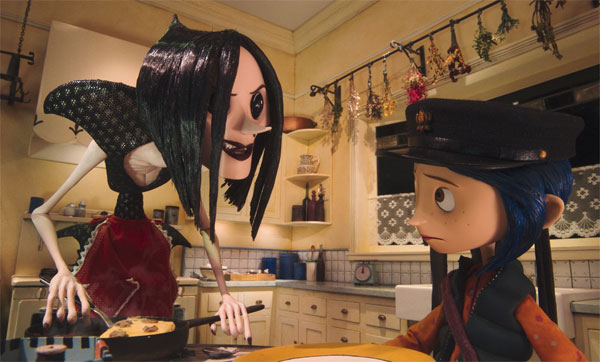
44. Coraline (2009)
| From the original review: “Made with as much care and attention to detail as the best of Pixar…Selick’s clever Coraline is a children’s fable that moves with purpose, bristles with dark humor, and snaps together with satisfying, text-adventure logic. Like Dahl, Carroll, del Toro, and Rowling, Selick and Gaiman get that kids have more of an appetite for the unsettling and creepy than they’re often given credit for, and that the best fairy tales are often dark, scary places. Coraline is no exception…And in terms of the sheer wealth of imagination and meticulous craftsmanship on display, it’s hard to imagine that very many other films this year will be in Coraline’s orbit“
From the year-end list: “In an auspicious year for both regular and stop-motion animation, Henry Selick’s adaptation of Neil Gaiman’s Coraline was the pick of the litter. It sorta got lost in the early-year shuffle, but Selick & Gaiman’s dark, twisted fairy tale delivered the goods, and hopefully it’ll find more life on DVD. “ |
As I said just above, Henry Selick and Neil Gaiman’s dark stop-motion fable “gets” a simple truth about kids that much conventional children’s fare misses. A lot of little tykes — dare I say most? — are more than a bit twisted. They thrive on weird and scary and grotesque. And Coraline produces — It has the unsettling dream logic and elemental sense of scary that you find in Roald Dahl or the tales of the Brothers Grimm. And the stop-motion looks amazing — It manages to fashion an eerie, home-spun look that was perfect for the story and that CGI-sheen can’t (as yet) muster. Definitely worth a rental.
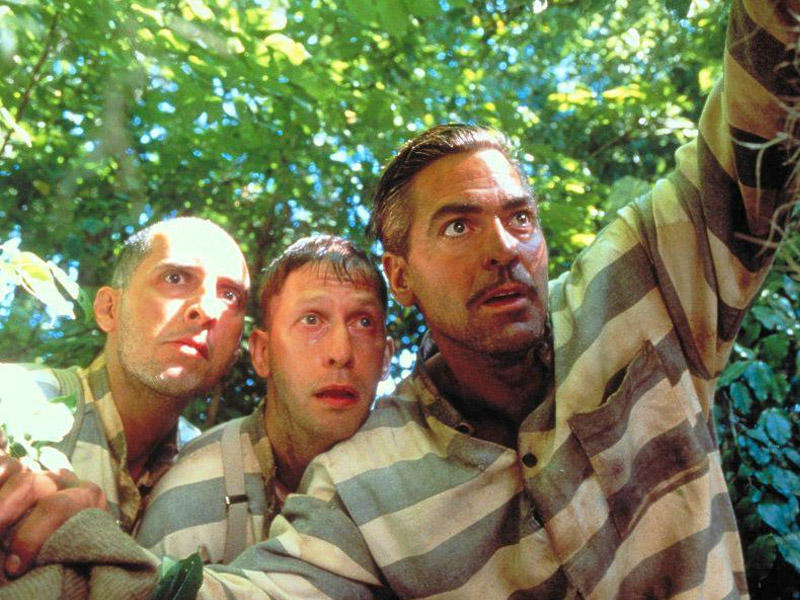
43. O Brother Where Art Thou? (2000)
| From the year-end list: “To be honest, I wanted to like it more. Nevertheless, this amusing Coen paean to American folk and Faulknerian absurdity holds its own this year.“ |
Like every other Coen movie, O Brother is a film that rewards repeat viewings. And this Southern gloss on The Odyssey, by way of Preston Sturges, has definitely grown on me over the years. As with so much of the brothers’ output, things that tend to come off as bizarre non-sequiturs at first eventually seem like inspired lunacy once you vibe to it. (“Do not seek the treasure…“) Here’s hoping Burn After Reading ages similarly.
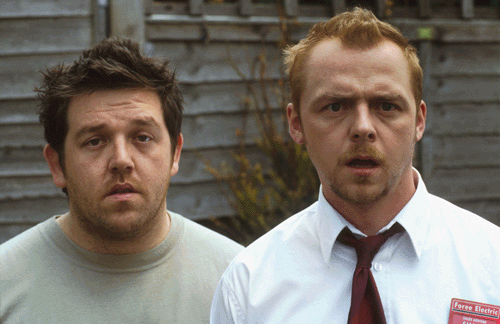
42. Shaun of the Dead (2004)
| From the original review: “A friend of mine saw the trailer for Shaun of the Dead and noted it looked like a zombie movie written by The Kinks. That’s actually a pretty good shorthand for this wry, witty film, although it eschews Ray Davies-like bitterness for a romantic comedy sweet that, for the most part, fits quite well. In fact, for the first hour or so, Shaun of the Dead is a total gas, particularly as Shaun and his couch-potato roommate Ed (Nick Frost) verrry slowly get wise to the shambling undead amidst them.“
From the year-end list: “Although it lost its footing shambling to its conclusion, Shaun of the Dead was great fun for the first two-thirds of its run, and it’s now probably my favorite zombie movie (everyone should have one.) A much-needed dry British humor fix to tide us over until Hitchhiker’s Guide.“ |
Zombieland may have aspired to the throne in 2009, but Edgar Wright’s Shaun of the Dead remains the original and undisputed king of the “rom-zom-coms.” Few movies this decade have been as endlessly rewatchable, and, if nothing else, Simon Pegg’s Shaun has provided me with a great Halloween costume over the years. (It’s worked much better than my stab at Donnie Darko, and makes for a great lithmus test to find the movie-people at any given Halloween party right away — not to mention the women-who-find-men-who-look-vaguely-like-Simon-Pegg-fetching, which, as you might have guessed, is a key demographic for yours truly.)
The Pegg-Frost-Wright follow-up Hot Fuzz didn’t make this list, alas, although it is a very entertaining village romp through cop-movie cliches. But here’s hoping that Scott Pilgrim vs. the World and, whenever it gets off the ground, Ant-Man, will make next decade’s top 100, come 2019.
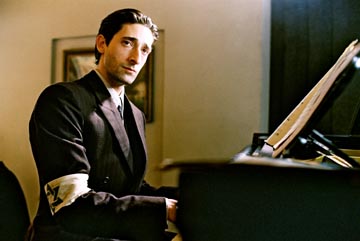
41. The Pianist (2002)
| From the original review: “The first half plays out as a well-done and unflinching (non-Spielbergized) look at life and death in the Warsaw ghetto. (Watching Adrien Brody step over the bodies of starved children on his way to work, I was briefly reminded again of how unbelievably unrealistic and offensive I found Roberto Benigni’s Life is Beautiful.) The second half, however, is a different story. When through a combination of luck and timely aid Szpilman finally manages to escape the ghetto, the film enters (at least to me) novel territory and becomes a strangely riveting and unfamiliar survival story.“
From the year-end list: “A 2002 film that I caught in March of this year, The Pianist is a harrowing and unique survivor’s tale that’s hard to watch and harder to forget (and I can’t have been the only person who thought post-spider-hole Saddam bore a passing resemblance to Brody’s third-act Szpilman.) Speaking of which, I said in my original review of Adrien Brody that ‘I can’t see the Academy rewarding this kind of understatement over a scenery-chewing performance like that of Daniel Day-Lewis in Gangs of New York.; Glad to see I was wrong.“ |
Just as I don’t ever cover Hollywood gossip here at GitM, I don’t really want to get into the kerfuffle that has reignited over Roman Polanski this past year. On one hand, what Polanski did was disgusting, reprehensible, and certifiably criminal, and there’s no getting around that. On the other hand, we just spent much of the past year basking in the afterglow of Michael Jackson’s contributions to music, and the King of Pop, by most plausible accounts, indulged in similar predilections. Imho, what’s good for the goose is good for the, uh, goose.
My point being, their personal lives aside, I still think Thriller is one of the best pop records of the past three decades, and The Pianist is one of the more powerful and engaging entrants in Holocaust cinema out and about. This is the story of the Holocaust outside the camps, and without that telltale Spielberg gloss. For most of the movie’s run, patently craven behavior and sheer blind luck are as crucial life-or-death determinants as anything else. And even if Brody’s pianist gets his own personal Oskar Schindler late in the film, the remorseless existentialism that drives Polanski’s worldview here — and most likely everywhere else, given the personal nature of this flick — has already been well-established by then. Not for the faint of heart, The Pianist feels sadly and uncomfortably true.

40. Knocked Up (2008)
| From the original review: “Well, as you’ve probably heard, Knocked Up is both very, very funny and surprisingly real. For one, it’s got a funky, down-to-earth, DIY, lived-in feel that helps make it, along with Hot Fuzz, the most satisfying comedy of 2007 thus far. But Knocked Up also manages to be rather touching by the end, in a way that feels totally earned. The film doesn’t rely on cutesy baby antics or wildly improbable romantic flourishes to garner your affection, but rather on showing flawed, realistic, well-meaning people trying to make the best out of the complicated situations that make up life, be they modern love, marriage, or an unplanned pregnancy. As such, Knocked Up turns out to be a knock-out, and a very welcome special delivery.“
From the year-end list: “Judd Apatow’s sweet, good-natured take on modern love and unwanted pregnancy was probably the most purely satisfying film of the summer. As funny in its pop-culture jawing as it was well-observed in its understanding of relationship politics, Knocked Up also felt — unlike the well-meaning but overstylized Juno, the film it’ll most likely be paired with from now herein — refreshingly real. “ |
I almost put The Forty-Year-Old Virgin here, which is also very worthwhile in its way. But in a decade where American comedy seemed to be verging toward all-Apatow, all-the-time in its latter stages, Knocked Up was the former Freaks & Geeks auteur’s most fully-realized creation of the decade. (FWIW, F&G came out in 1999.)
It is also, as David Denby pointed out in one of his better moments, the apotheosis of the slacker-striver romance that characterized countless rom-coms and quasi-rom-coms of late, from About a Boy to The Break-Up to, for that matter, the next movie on this list. And more than 40-Year-Old-Virgin and more too than Juno, the other unintended pregnancy fable of 2007, Knocked Up — Seth Rogen’s palatial digs therein notwithstanding — felt like life in the Oughts as it really went down.
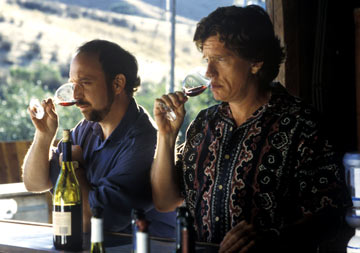
39. Sideways (2004)
| From the original review: “In sum, Miles is almost completely beaten down by life…so of course he attracts the attention of a smart, beautiful woman (Virginia Madsen) who shares all his important interests and remains fond of him, even and despite his awful behavior. If you can get past this one critical and wholly improbable plot point (and I did, eventually), Alexander Payne’s Sideways is a trip to California wine country well worth taking. The movie basically plays like an approaching-middle-age version of About Schmidt (right down to the unfortunate nude scene), but this seemed a more well-rounded and generous film than its predecessor.“
From the year-end list: “Like a fine 1961 Cheval Blanc, Alexander Payne’s elegiac toast to California wine country and the regrets and indignities of middle-age has a tendency to linger in the senses. Paul Giamatti must tire of playing depressive, barely sociable losers, but he’s great at it here…Sideways isn’t as funny as Election, but it is a memorable trip.“ |
To be honest, I still find it hard to forgive Sideways its central conceit. Speaking of slacker-striver romances, what on earth would Virginia Madsen ever see in Paul Giamatti’s character? But that aside, Sideways was still one of the more memorable indy-dramedies of the decade, and, like wine and O Brother, it too has improved with age. (That being said, I still prefer Payne’s Election, but that was also part of the season of riches that was 1999.)
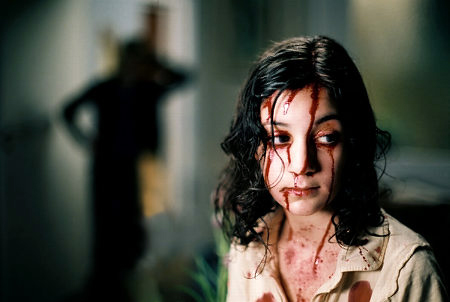
38. Let the Right One In (2008)
| From the original review: “A Swedish import that combines elements of the age-old vampire mythos with My Girl, My Bodyguard, and Morrissey (hence the title), Let the Right One In moves and feels like a particularly well-crafted Stephen King short story (or perhaps a bleaker version of one of Guillermo del Toro’s Spanish Civil War fairy tales), and definitely makes for a compelling nightmare before Christmas if you’re in the mood for it…[A]t times it feels as naturalistic, character-driven, and hyperliterary an endeavor as In the Bedroom or Little Children. There’s definitely some gore here and there, but as with the best horror stories, Let the Right One In is most frightening in the realm of ideas, and for what it doesn’t ultimately show or explain.“
From the year-end list: “As if living in public housing in the dead of a Swedish winter wasn’t depressing enough, now there’s a nosferatu to contend with… My Bodyguard by way of Ingmar Bergman and Stephen King, this creepy and unsettling tale of a very unsparkly pre-teen vampyrer will leave bitemarks long after you step out into the light.“ |
Y’all can keep your sparkling emo-Mormon vampires, thank you very much. (Although we would like Michael Sheen back when you’re done with him.) This creepy and understated Swedish horror story of 2008 pretty much filled my own quota for teenage nosferatu love for the decade. Yep, it’s a doozy, alright. And, not to get all Glenn Beck up in here, but you may leave as scared of life in Swedish socialist-style public-housing in the dead of winter as of the actual vampyrer at hand.
One word of caution: If you rent this film, watch it with subtitles — I once saw ten minutes of Let the Right One In dubbed and the whole enterprise seemed tonally off. Speaking of which, I’m averse to the idea of the forthcoming American remake, Let Me In, particularly given that it’s being brought to us by the director of Cloverfield. Still, I must concede, it has assembled a darned good cast: Chloe Moretz of (500) Days of Summer and Kick-Ass, Kodi Smit-McPhee of The Road, and Richard Jenkins as the handler, so to speak.
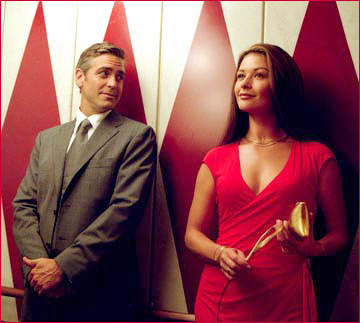
37. Intolerable Cruelty (2003)
| From the original review: “I’m pleased to report that the Coens’ first foray into full-fledged romantic comedy (although one could argue for The Hudsucker Proxy) is an out-and-out winner. I’d heard earlier that the Coens had diluted their trademark zaniness for the sake of a mainstream audience this time around, but I found the reverse to be true — the brothers have instead juiced up what could have been a tired genre exercise (Imagine this film with Matthew McConaughey, Hugh Grant, Kate Hudson, or Sandra Bullock) with their unique flair and managed to create one of the best, funniest romantic comedies I’ve seen in some time.“
From the year-end list: “I expect I’ll be in the minority on this pick – This more-mainstream-than-usual Coen joint only got above-average reviews, and hardly anyone I’ve spoken to enjoyed it as much as I did. Still, I thought Intolerable Cruelty was a pop delight, 99.44% pure Coen confection…Light and breezy, yeah, but I thought it was that rare breed of romantic comedy that actually manages to be both romantic and hilarious…[I]t’s good to know we can always rely on the Coens for consistently excellent work, and I for one am greatly looking forward to The Ladykillers.“ |
Ok, so The Ladykillers didn’t work out so hot. Still, Intolerable Cruelty is a much-maligned film, in my opinion. Featuring George Clooney at the top of his Coen game and Catherine Zeta-Jones as a natural foil for his throwback, matinee idol looks, Intolerable Cruelty was a rom-com that, I thought, zinged with some of that old-Hollywood, His Girl Friday-type pizazz.
Ok, Geoffrey Rush is over-the-top here, and so are a lot of the jokes, from the Tenzing Norgay, “Heinz, the Baron Krauss von Espy” business to Wheezy Joe’s fatal inhaler problem. (For that matter, Cedric the Entertainer’s part seems tailor-written for Jon Polito, and the Coens eventually re-used the really-old law partner joke in here for the Rabbi Marshak in A Serious Man.) Still, the cat-and-mouse romance at the center of Intolerable Cruelty works quite well, and it’s a great deal of fun to watch play out. Try it, you’ll like it.
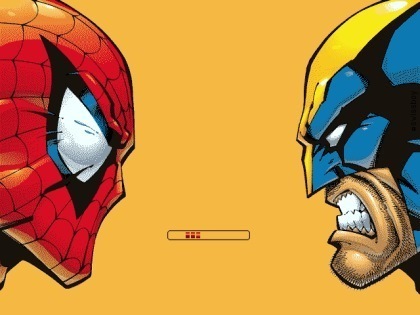
36. X2: X-Men United (2003) / Spiderman 2 (2004)
| From the original review (X2): “I’m not sure how it’ll play to people who didn’t grow up on the comic, but last night’s midnight showing of X2 was much better than I had anticipated. Offhand, I can think of three setpieces (Nightcrawler at the White House, the assault on the mansion, and Magneto’s escape) that were the closest thing to fanboy pr0n I’ve seen in ages (LOTR notwithstanding), and that’s not counting all the great little flourishes and knowing winks throughout…Sure, the film drags a bit in the last twenty-five minutes or so (as they set up X3), but overall Singer & co. hit this one out of the park.“
From the year-end list (X2): “Laugh if you want, but I can’t think of any other movie where I had more fun this year. Arguably the most successful comic film since Superman 2, X2 improved over its rather staid predecessor in every way you can imagine…X2 was ripe with moments that seemed plucked directly out of the comics, if not straight out of the fanboy id. To me, my X-Men.“ From the original review (S2): “Here he comes, watch out bud. He’s got genetically engineered blood…and a frozen run of bad luck like you read about. After a series of underwhelming summer films so far, Spiderman 2 is a happy surprise, and a distinct improvement on the decent original. After an up-and-down first outing, both Sam Raimi and Tobey Maguire (as well as the gaggle of writers on board, among them Michael Chabon) have clearly settled into the rhythm of Peter Parker’s struggle-filled existence, and the result is the most enjoyable and faithful comic book adaptation this side of X2.“ From the year-end list (S2): “A definite improvement on the first adventure of your friendly neighborhood wallcraller, Spiderman 2 was a perfectly made summer film that stayed true to the spirit of Peter Parker. Along with X2, this is the gold standard for comic book-to-film adaptations right now.“ |
Eh, you know, in the end, I just couldn’t decide. With the onerous origin stories out of the way in each of their respective first films, Bryan Singer’s X2 and Sam Raimi’s Spiderman 2 were both a chance to let these beloved characters’ freak flags fly. And, taken together, they were the highlight of Marvel movie-watching in the Oughts. Even more than Batman’s much-heralded second outing this decade (still ahead of us on this list) there are scenes in both X2 and Spiderman 2 that feel like four-color panels come to life, from Spidey crawling on the ceiling while talking smack to Doc Ock to Magneto chuckling with glee while floating away from his until-recently-inescapable glass prison.
Both franchises hit a serious wall in their third outings, of course — the poor, long-suffering mutants more so than our friendly neighborhood wallcrawler. Still, both X2 and Spidey 2, like Stephen Norrington’s Blade, Jon Favreau’s Iron Man, and hopefully Kenneth Branagh’s upcoming Thor, proved that certain Marvel franchises can be very translatable to the screen when left alone in the right hands.

35. The Wrestler (2008)
| From the original review: ““I’m an old broken-down piece of meat and i deserve to be all alone. I just don’t want you to hate me.” If that’s your man, then tag him in: The final and best film of last Friday’s four, Darren Aronofsky’s The Wrestler is a downbeat, moving, and resonant character study of a man past his moment. If Frost/Nixon was the ‘feisty underdog takes on the champ’ Rocky movie of the day, The Wrestler captured the other half of that famous story — the aging athlete shuffling around his ‘real’ life, looking for any place he can make sense of himself outside the ring…I wouldn’t cry foul if The Wrestler manages to pin down Oscars for Rourke and/or Tomei, and it’s too bad Aronofsky got locked out of Best Director contention this year — dabbling in the ‘rassling form has clearly been good for him.“
From the year-end list: “Have you ever seen a one-trick pony in the fields so happy and free? Me neither, to be honest, but Aronofsky’s naturalistic slice-of-life about the twilight days of Randy “the Ram” Ramzinski was likely the next best thing. I don’t know if Mickey Rourke will experience a career resurrection after this performance or not. But he won this match fair and square, and nobody can take it from him.“ |
Displaying an understatement and naturalism one wouldn’t guess he possessed after Pi, Requiem for a Dream, and The Fountain, Darren Aronofsky hit one out of the park with The Wrestler, thanks in large part to Mickey Rourke’s turn as, well, Mickey Rourke. With key support by Marisa Tomei (who had a much-better decade than 1992’s My Cousin Vinny would ever have predicted), The Wrestler was an-almost perfect match between actor and role, and a small but very effective movie about the indignities accompanying an aging and forgotten warrior’s latter days. Another round to the Ram.

34. The Hurt Locker (2009)
| From the original review: “A taut, minimalist “men-in-combat” thriller that immediately goes up on the top shelf of Iraq flicks next to HBO’s Generation Kill (and, if you’re counting Gulf War I, Three Kings), The Hurt Locker is also that rare thing in the summer of Terminator: Salvation, Transformers, and GI Joe: a war movie for grown-ups…In vignette after vignette, The Hurt Locker ratchets up the suspense by degrees, until you find yourself — like the EOD team we’re following — living out each moment in a heightened state of tension, endlessly waiting for the other shoe to drop. It’s an impressive moviemaking feat, and it helps to make The Hurt Locker one of the best films of the year.“
From the year-end list: “Bombs away, and we’re not ok. Other than Modern Warfare 2 and Generation Kill, this immersive, nail-biting account of an IED team’s travails in the midst of the suck was the best pop culture simulator out there for feeling embedded in Iraq…and stuck at the wrong Baghdad street corner at just the wrong time. And with the tension ratcheting to uncomfortable levels in each of the ordnance disposal scenes, Kathryn Bigelow’s The Hurt Locker…was the action movie of the year.“ |
Of course, warriors’ glory days aren’t all that much better, as evidenced by Kathryn Bigelow’s tense and sparing The Hurt Locker. But, as with Randy the Ram, Jeremy Renner’s Staff Sgt. William James has a taste — some might say addiction — for the ring.
Like the IED team it follows, Bigelow’s movie succeeds mainly because of its attention to detail — not only in ratcheting up the unbearable tension throughout, but in the little moments. Say, for example, the scene with Jeremy Renner in that suddenly ridiculous-looking American supermarket, or his interactions with the locals (both the kid selling DVDs, and the “safe” house he finds himself in later.) The Hurt Locker doesn’t really offer three-part character arcs or easy-to-digest answers — It just puts you right in the thick of danger, with all the fear and excitement that portends. War is a drug, indeed.

33. A Serious Man (2009)
| From the original review: “He may seem cruel and indifferent. He may even be vain and jealous (Exodus 20:5.) Still, thank HaShem for the Coens! Like manna from Heaven, the brothers are the cinematic gift that keeps on giving. At this late date, you probably know if you vibe to the Coen’s mordantly kooky aesthetic or not. And if you do, A Serious Man, their sardonic reimagining of the Book of Job set in late-sixties Jewish suburbia, is another great movie in a career full of them…A word of warning, tho’ — Despite the funny on hand here, and there is quite a bit of funny, in a way this world may be the Coens’ darkest yet.“
From the year-end list: “Oy vey. This existential disquisition into wandering dybbuks, sixties Judaica, quantum mechanics, and Old Testament justice was yet another triumph for those devilishly talented brothers from Minnesota. The Job-like travails of Larry Gopnik introduced us to several colorful, Coenesque personages (Sy Ableman, Rabbi Nachtner) and offered vignettes (the Goy’s Teeth) and quotable philosophy (“Receive with simplicity everything that happens to you”) that cinephiles will ponder for awhile to come. The Coens abide.“ |
In another decade of solid-to-great offerings, A Serious Man was Joel and Ethan Coen’s best comedy of the Oughts, particularly for those who like their Coen craziness straight from the tap. Going home to Minnesota for this inquiry into Judaism, mathematics, and the meaning of it all clearly brought out the best in the brothers, and the Coens ended the decade as they began, in lean, fighting trim. Whether it’s Hail Caesar! or True Grit, keep ’em coming, guys. Each Coen movie is a mitzvah for the rest of us.
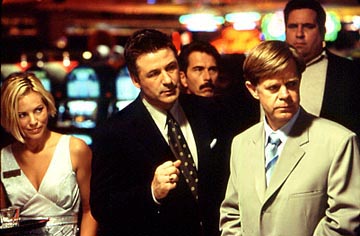
32. The Cooler (2003)
| From the original review: “True, you can guess where this is basically going from the opening moments. The Cooler is ultimately a brief genre exercise in noir romance – It’s not reinventing the wheel. But the wry script takes a few jags I wasn’t expecting, and Kramer, Macy, and Bello succeed in fashioning two lovebirds who veer from playful to amorous to desperate for each other in a way that belies the cookie cutter courtship of so many other films…[I]f you can stomach the occasional burst of Old Vegas-style mob brutality (usually at the hands of Baldwin), The Cooler is a testament to the notion that even perennial losers can sometimes catch a lucky break, and a touching character-driven romance well worth checking out.“ |
Word is the rest of the decade didn’t go so hot for director Wayne Kramer, what with 2006’s Running Scared and 2009’s Crossing Over. (I didn’t see either…did Crossing Over even come out?) But The Cooler, a magical-realist tale about the mystifying blessings of Lady Luck, was one of my favorite movie romances of the Oughts…and one that side-steps the Madsen-Giamatti Sideways problem with a key second-act twist. William H. Macy and the very underrated Maria Bello both bring their A-game to this Vegas fable, and Alec Baldwin does yeoman’s work in the type of meaty character role he’d make his own as the decade unwound. Who knows? Maybe luck was just shining on Kramer that year.
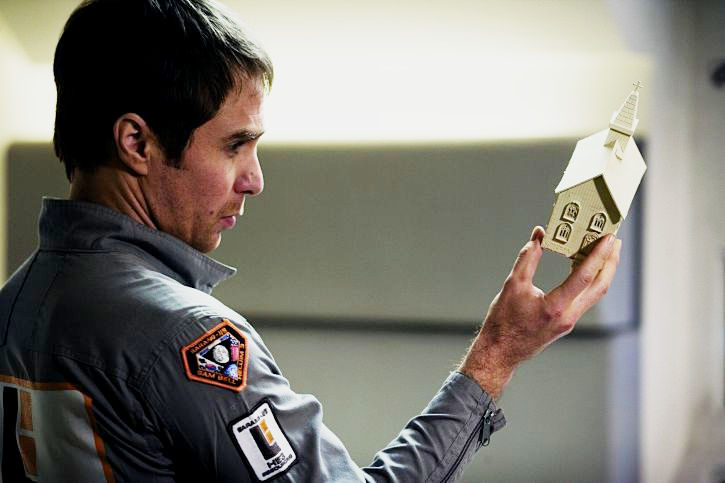
31. Moon (2009)
| From the original review: “Granted I tend to be a sucker for these sorts of films, which are far too rare nowadays…Nevertheless, I found Duncan Jones’ low-key, hard-sci-fi rumination Moon to be really, really great — exactly the sort of small-budget ‘big think’ science fiction production that it feels like you used to see a lot more of back in the day. (Silent Running, Outland, even stuff like Capricorn One and Soylent Green.)…Sure, I probably saw this film under ideal conditions for the subject matter — by myself at the 11:45pm showing — but I was riveted by it. And if you’re a science fiction fan (or a fan of Sam Rockwell, who’s showcased here to great effect), Moon is a must-see.“
From the year-end list: “While Michael Bay, McG and their ilk tried to top each other with gimongous explosions this summer, Duncan Jones’ moody, low-key Moon just aimed to blow our minds. A throwback to the seventies big-think sci-fi that has fallen out of favor in the post-Star Wars-era, Moon’s big special effect, other than Sam Rockwell, of course, was its clever ideas. And in a year of hit-or-miss (mostly miss) blockbusters, Rockwell’s quiet two-man show turned out to be the sci-fi extravaganza of 2009.“ |
I feel like I’ve been chatting up this movie quite a bit lately. Still, in case y’all missed the thread, I really dug Duncan Jones’ Moon. It’s all of a piece — A small, well-thought-out, and low-fi flick that just aims to tell an interesting science fiction tale and get you thinking, no more, no less. And amid the sturm und drang of Bayhem and McG’s killer robots and Cameron’s Pandora in 2009, I thought Moon‘s relative silence spoke volumes.
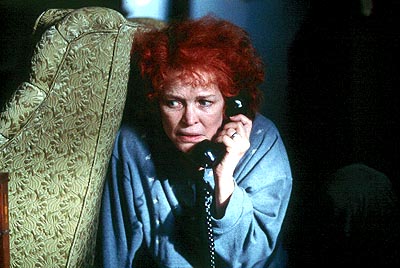
30. Requiem for a Dream (2000)
| From the original review: “Technically, Requiem is a masterpiece. Darren Aronofsky pulls out every visual effect and cinematic sleight of hand he previewed in Pi, and then some, to great effect. There are some truly unforgettable moments in this movie, although I must admit that — very occasionally — the technical razzmatazz does get in the way…[D]espite…substantial problems, Requiem is a powerful, enthralling film that invites comparison with such downer classics as A Clockwork Orange and Taxi Driver. Two days later, I’m still mulling it over in my head. I’m not sure if I completely enjoyed it, but I do know I must recommend it.“
From the year-end list: “Powerful, dazzling, and a technical masterpiece, despite the flawed ending. Gets stuck in your head like bits of food get stuck in your teeth.“ |
Ah, Requiem for a Dream. In many ways, I tend to think this flick is wayyyy too over-the-top to be taken at all seriously. And by hyperaccentuating the extreme negatives of drugs here, what with the gangrenous limbs and heroin-fueled whoredom and whatnot in its final act, it sorta misses out on the reasons why people tend to take drugs in the first place. (Hint: They may in fact be enjoyable at times.) In that sense, at its worst moments, Requiem for a Dream can be as hyperbolic, monotone, and quite frankly ridiculous as a Nancy Reagan “Just Say No” ad.
But, for all of its occasional this-is-your-brain-on-drugs ludicrousness, Darren Aronofsky’s Requiem is undeniably a powerful and hypnotic movie experience. Between Ellen Burstyn even outdoing Bale’s American Psycho that year in a just-go-for-broke performance — I still think she got cheated out of the Oscar — and the droning, brain-slashing score by Clint Mansell and the Kronos Quartet (now a staple of movie trailers, thanks to The Two Towers), Requiem has moments that are still burned into my skull a decade later.
And with one clever film conceit, Aronofsky vividly captured one facet of addiction that rings all too true, whether your vice is cigarettes, heroin, TV, or Oreo cookies: Half of the draw — well, maybe not half, but a sizable chunk, at least — is the comfortable routine of a process. I guess that’s why they call it a habit.
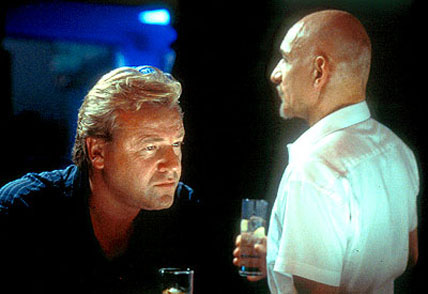
29. Sexy Beast (2000)
True, Ben Kingsley’s surprising turn as a foul-mouthed Cockney madman is a bit of a gimmick. (In fact, Ralph Fiennes later used said-gimmick himself in 2008’s In Bruges.) Still, Jonathan Glazer’s Sexy Beast was a smart and funny crime thriller that introduced many of us to the venerable Ray Winstone (although Wikipedia now informs me he’s been around since Quadrophenia) and that anticipated Ian McShane’s later breakout/comeback as Al Swearingen of Deadwood. (Spoiler alert: It’s also one of two movies here in the twenties that involve supernatural leporids.) And to my mind, some of the inspired England v. Spain riffing herein just never gets old.

28. Milk (2008)
| From the original review: “Arguably the best film about the realities of politics since Charlie Wilson’s War, Milk is blessed with excellent performances across the board — most notably Sean Penn, James Franco, and Josh Brolin, but also supporting turns by Emile Hirsch, Alison Pill, and others. And as a chronicle of a key moment in an ongoing civil rights struggle, Milk also feels like a watershed film of its own in its approach to its gay and lesbian characters. In short, it’s one of the best films of 2008.“
From the year-end list: “What with a former community organizer turned ‘hopemonger’ being elected president — while evangelicals, conservatives and sundry Mormons inflicted Proposition 8 on the people of California — Gus Van Sant’s vibrant recounting of the tragedy of Harvey Milk was obviously the timeliest political movie of 2008. But, in a year that saw entirely too much inert Oscar-bait on-screen in its final months, Milk — romantic, passionate, and full of conviction — was also one of the most alive. While it extends some measure of compassion even to its erstwhile villain (Josh Brolin), Milk is a civil-rights saga that harbors no illusions about the forces of intolerance still amongst us, and how far we all still have to go.“ |
A film that put the lie to Brokeback Mountain‘s Kabuki-theater austerity to some extent, Gus Van Sant’s Milk featured gay couples that were more passionate, more realistic, and, perhaps most importantly, more matter-of-fact than those decidedly not co-habiting in Ang Lee’s Wyoming. Unlike the tragedy of Jake and Heath (or 1993’s Philadelphia, for that matter), it showed mainstream (straight) audiences that being gay isn’t, or at least shouldn’t be, a matter of life and death. In fact, gay couples are a lot like straight couples — varied, heterogeneous, often in lust, sometimes in love.
And its sexual politics aside, Milk was also a smart and insightful film about our American political system as a whole — maybe especially in the year of Candidate Obama and Prop 8, but just as much so today. After all, the struggle for real change in America didn’t end when Harvey Milk got elected. It was only just beginning.

27. Layer Cake (2005)
| From the original review: “[A] smart, stylish, and sublimely smooth British crime film that does Guy Ritchie’s Lock, Stock, and Two Smoking Barrels and Snatch one better…Essentially, you know the drill — this is a puzzle film in which you’ll have to listen carefully and learn to distinguish between various delinquents with names like Tiptoes, Kinky, Slasher and Shanks. And, while the final few grifts just get a bit too big to be believable, for the most part the story holds together with intelligence and verve, in no small part to Daniel Craig, who’s a magnetic presence here, and Matthew Vaughn, who displays a crisp, confident direction that’s all the more impressive for being showy without ever seeming flashy.“
From the year-end list: “If X3 turns into the fiasco the fanboy nation is expecting with Brett Ratner at the helm, this expertly-crafted crime noir by Matthew Vaughn will cut that much deeper. Layer Cake not only outdid Guy Ritchie’s brit-gangster oeuvre in wit and elegance and offered great supporting turns by Michael Gambon, Kenneth Cranham, and Colm Meaney, it proved that Daniel Craig had the requisite charisma for Bond and then some (and that Sienna Miller is no slouch in the charisma department either.)“ |
In retrospect, Casino Royale should probably have been listed as one of the honorable mentions in the first quarter of this list. Nonetheless, Daniel Craig first proved he had the chops for 007 — and then some — with his star turn in this well-made and very entertaining Cockney crime drama. And he’s only the pick of the litter here: Layer Cake also includes wily hands Michael Gambon, Colm Meaney, Jamie Foreman, Kenneth Cranham, and George Harris, as well as able performances by others soon-to-break-out like Ben Whishaw, Tom Hardy, and Sienna Miller. (Sure, one could argue Tom Hardy of Bronson “broke out” as the evil Picard clone in 2002’s Star Trek: Nemesis. But did you see Star Trek: Nemesis? Being in that movie should be considered the opposite of breaking out, I should think.)
True, Matthew Vaughn’s Stardust turned out to be amiable and mostly forgettable for me. But, if I’m holding high hopes for his Kick-Ass in 2010, it’s because of Layer Cake, a movie that just got edged out of the top twenty-five. Along with…

26. Garden State (2004)
| From the original review: “Seduced in by this teaser (and the accompanying song, Frou Frou’s “Let Go”, which has been flitting about my head for days now), I entered expecting a stylish but showy and self-indulgent film, as befitting a first-time triple threat. (At worst, I feared something along the lines of a Whit Stillman or P.T. Anderson flick.) But Garden State feels not only intelligent and confident but grounded, understated, and, like its dazed, over-medicated protagonist, even somewhat self-effacing. More than anything, I found the movie a sweet, quirky, and good-natured tone poem about awakening to both the pain and the possibilities of the life around you.“
From the year-end list: “Writer-director Zach Braff’s ‘anti-Graduate’ debut was a small but touching ode to home that, along with reviving Natalie Portman as an actress and offering the best soundtrack of the year, delivered exactly what it promised. A bit hokey at times, sure, but Garden State wore its heart on its sleeve and, for the most part, got away with it. It was a witty and eloquent voyage to the Jersey burbs and a testament to the proposition that as Paul Weller put it, it’s never too late to make a brand new start.“ |
As I’ve said many times, Zach Braff’s Garden State is a bit of a guilty pleasure, but perhaps I should stop making excuses for it. It had the closest thing to a Pulp Fiction-like era-defining soundtrack that the Oughts saw, with cuts by Frou Frou, The Shins, Colin Hay, and Iron & Wine. It had a cast stocked with quality, A-list talent like Ian Holm, Peter Sarsgaard, and the inimitable thespian Method Man. (Where my cheese at?) It managed to bring Natalie Portman back to life after her near-fatal submersion in George Lucas’ green-walled CGI prequel tank. And, like Moon, it was a small film that delivered about exactly what it promised.
In short, Garden State is pretty close to a modern version of the movie it so often references, The Graduate. (Or, at least, it’s a heck of a lot closer to The Graduate than 2005’s Rumor Has It, which more explicitly tried to make that claim.) What can I say? For me, at least, Garden State delivered.
25, 25 movies to go…and here’s the next 15.

